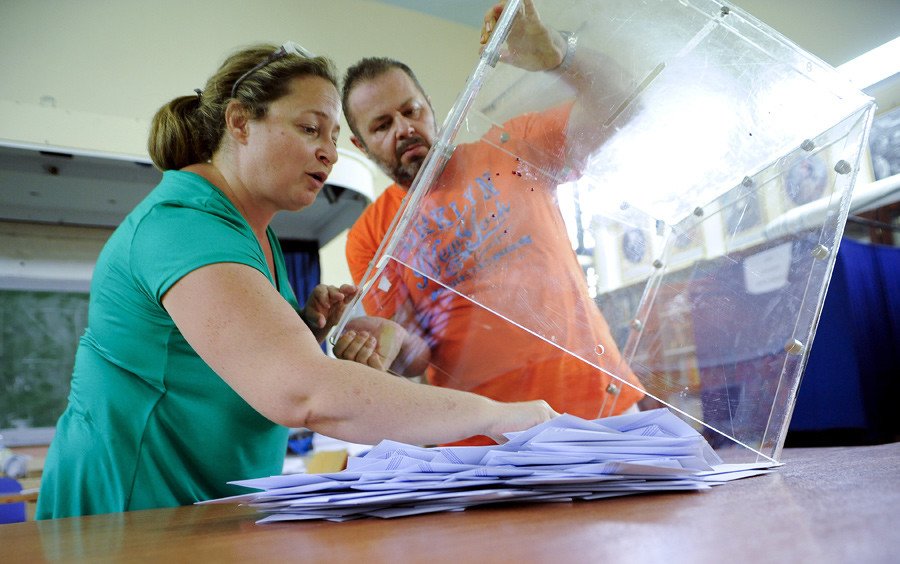‘Greek parliament: Deficit of democratic representation’

Greeks no longer believe that any of the big parties have an alternative solution to the debt crisis, said filmmaker Aris Chatzistefanou, commenting on the parliamentary election, where pro-austerity parties, including Syriza took control.
READ MORE: Syriza leading in exit polls as disillusioned Greeks cast votes in snap election
Aris Chatzistefanou, filmmaker
RT: Why are the Greeks giving Tsipras a second chance after signing a deal with Brussels against the popular will?
Aris Chatzistefanou: First of all we should realize that it is not all the Greek people that voted [Sunday] –almost one out of two Greek voters never bothered going to the polls. That is not because they don’t care about their political procedures or the democratic procedures, but they don’t believe anymore that any of the big parties that asked for their vote could have an alternative solution to the debt crisis. So we have possibly the worst case scenario - and the best case scenario for Germany and the Greek lenders. We have a parliament where the pro-austerity forces, including Syriza, take control. We only have the Communist party as a party that would not accept the austerity. There is also the threat of the Nazis that became the third party [Golden Dawn]. I would say that we have a deficit of democratic representation especially after the referendum, where 62 per cent of the population voted ‘no’ to the austerity, voted ‘no’ to the memorandums imposed by the EU and the IMF.
RT: Could the far-right Golden Dawn party become the main opposition force in the future?
AC: They present themselves as having an anti-systemic façade... It is a façade; it is not what they really believe in. If you see what they voted for when they were members of the parliament during the previous government: they supported privatizations, they supported slicing the minimum wages and firing people. It is not a real anti-austerity force. Unfortunately, the real anti-austerity force is coming mainly from progressive movements and left-wing parties [that] are not represented, apart from the Communist party.
But there is a threat. [As] the famous philosopher Walter Benjamin once said – “[behind] every fascism there is a [failed] revolution.” We never had a revolution of course in Greece, but we had the hope that something could change - that was the hope of the majority of the population. Now they see that the party that was characterized as a radical left-wing party just presented the worst memorandum, the worst austerity packages that anyone could imagine.
The problem is that the Greek population hasn’t felt yet the effects of this austerity policy. That is why Mr. Tsipras, the former Prime Minister and the new Prime Minister, wanted to have these elections as soon as possible - before the end of September and early October, when the effects will be felt on the population.
RT: Golden Dawn party has strong anti-immigration stance - are people fed up with austerity willing to turn a blind eye to this?
AC: Unfortunately, Greece has very serious economic problems and it was the worst time to receive this flow of refugees from other countries. I’m afraid that the fascists, Golden Dawn, but also other parties that support the austerity measures will try to find the scapegoats that they need in these refugees. The economic problems of Greece do not come from the refugees, even though they create some problems at the Greek borders. But when the economic infrastructure is collapsing people will want to have these scapegoats. I’m afraid to imagine what will happen if they manage through the mainstream media to persuade the population that the problem does not come from the EU and the structural problems of the eurozone, but it is coming from the refugees – these poor people that just try to survive from the wars that the EU and the US are creating in the Middle East.

Far-right Golden Dawn silent about Greek austerity measures
Leonidas Chrysanthopoulos, former Greek ambassador to Canada said the far-right Golden Dawn party made a remarkable move becoming pro-European in order to win Greek votes.
The Syriza party has regained power in parliamentary elections in Greece. Its leader Alexis Tsipras promised to fight for the dignity of the Greek people.
RT: Syriza first came to power opposing Brussels only to end up striking a deal. What went wrong?
Leonidas Chrysanthopoulos: They were blackmailed by the Germans who threatened to destroy Greece if the measures were not accepted. [Alexis] Tsipras had to accept this blackmail, according to what he said. Of course he could have easily denounced Germany to international public opinion and broke off diplomatic relations. But he didn’t do that. So basically the Greek people have to suffer now, the result of the third memorandum.
READ MORE: Greek snap election: New Democracy concedes defeat to Tsipras’s leftist Syriza
RT: Syriza won and is back in power in Greece. Do you think it will take a firmer stand against Brussels this time round?
LC: I don’t think so, because they have passed the legislation that was already imposed upon them. This happened in August, during the summer holidays. This is one of the reasons that we are having the elections now, because from October these measures will start to be implemented, it will start hurting the people.
RT: The far-right Golden Dawn party came third in this election on an anti-austerity and anti-EU platform. Could it become the main opposition anytime soon?
LC: No, because they have actually changed their position during the last month - they have become pro-EU and they are not speaking very much about the austerity measures. In order to get votes from some part of the Greek population they became pro-European, which was a remarkable move for their part.
RT:Syriza became popular as an anti-austerity party. Have they completely changed their politics now?
LC: Their policies are not the same. The people are more or less the same with the exception of the left-wing platform under [Panagiotis] Lafazanis which has left and which may not even make it into Parliament this time.
The statements, views and opinions expressed in this column are solely those of the author and do not necessarily represent those of RT.











